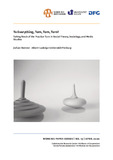Citation link:
http://dx.doi.org/10.25819/ubsi/1895Files in This Item:
| File | Description | Size | Format | |
|---|---|---|---|---|
| WPS_15_Genner.pdf | 1.08 MB | Adobe PDF |  View/Open |
| Dokument Type: | Book | metadata.dc.title: | To everything, turn, turn, turn? | Title addition: | taking stock of the practice turn in social theory, sociology, and media studies | Authors: | Julian, Genner | Institute: | DFG-Sonderforschungsbereich 1187 "Medien der Kooperation" | Free keywords: | Practice Turn, Practice Theory, Sociology of the Social Sciences, Turns | Dewey Decimal Classification: | 300 Sozialwissenschaften | GHBS-Clases: | NXX KLEX |
Issue Date: | 2020 | Publish Date: | 2020 | Series/Report no.: | Working paper series / SFB 1187 Medien der Kooperation | Source: | SFB 1187 Medien der Kooperation: Working Paper Series, No. 15, 2020. - URL: https://www001.zimt.uni-siegen.de/ojs/index.php/wps1187/issue/view/20. - ISSN: 2567-2517 | Abstract: | This article reviews the “practice turn” (PT) in sociology, social theory, and media studies. In addition, it develops a sociological perspective on turns in general. As other turns, PT presents itself as heterogeneous and interdisciplinary phenomenon lacking clear conceptual and institutional boundaries. In order to grasp this fuzziness inherent to PT, I regard PT as a “sign-post” (Wittgenstein 1984) giving rather vague directions and thus “assembling” (Latour 2005) a heterogeneous research community. Thus, my main question is as follows: How does PT guide research and how do researchers follow PT? Drawing on interviews with researchers involved in PT, I distinguish two major ideal-typical ways of following PT. Revolutionary approaches aim for overcoming existing ways of doing research by turning to practice. In contrast, reformative approaches aim for a renewal of disciplines. Whereas revolutionary approaches mainly arise in interdisciplinary fields and various “studies”, reformative approaches flourish on the margins of sociology. In exploring this pattern, the article develops a sociological way of reflecting PT and turns in general. Thereby the article establishes an institutional perspective drawing on the work of Boltanski and Chiapello (2007). |
DOI: | http://dx.doi.org/10.25819/ubsi/1895 | URN: | urn:nbn:de:hbz:467-16076 | URI: | https://dspace.ub.uni-siegen.de/handle/ubsi/1607 | License: | http://creativecommons.org/licenses/by-nc-nd/4.0/ |
| Appears in Collections: | Publikationen aus der Universität Siegen |
This item is protected by original copyright |
Page view(s)
544
checked on Dec 26, 2024
Download(s)
196
checked on Dec 26, 2024
Google ScholarTM
Check
Altmetric
This item is licensed under a Creative Commons License


